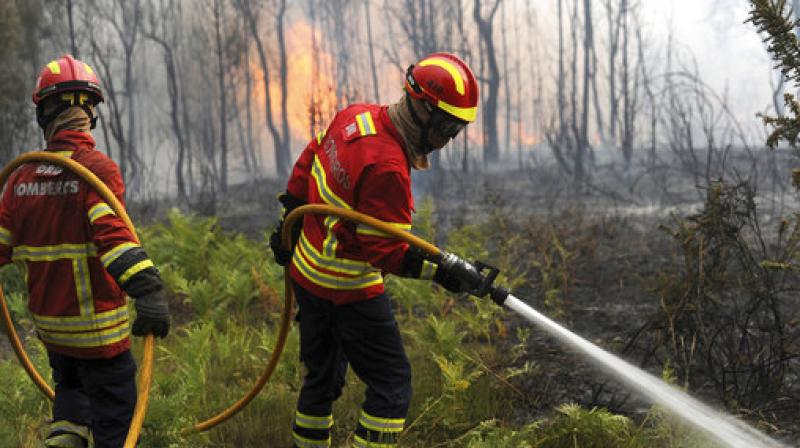Portugal awaits foreign help to fight deadly wildfires

Pedrogao Grande (Portugal): More than 2,000 firefighters in Portugal battled Monday to contain major wildfires in the central region of the country, where one blaze killed 62 people, while authorities came under mounting criticism for not doing more to prevent the tragedy.
Reinforcements, including more water-dropping planes from Spain, France and Italy, were due to arrive as part of a European Union cooperation program, officials said.
Portugal is observing three days of national mourning after the deaths Saturday night around the town of Pedrogao Grande, about 150 kilometers (90 miles) north of Lisbon, which is by far the deadliest on record.
Scorching weather, with temperatures surpassing 40 C (104 F), as well as strong winds and dry woodland after weeks with little rain fueled the blazes. The fire area is covered in dense woodland over steep hills.
Meanwhile, Portugal's leading environmental lobby group, Quercus, issued a statement Monday blaming the blazes on "forest management errors and bad political decisions" by governments over recent decades.
The association rebuked authorities for allowing the planting of huge swathes of eucalyptus, the country's most common and most profitable species but one that's often blamed for stoking blazes. Quercus also said official bodies don't do enough to coordinate wildfire prevention.
Emergency services have been criticized for not closing a road where 47 of the deaths occurred as people fled the flames Saturday night. The government has acknowledged that the huge fires occasionally led to a breakdown in communications.
Wildfires are an annual scourge in Portugal. Between 1993 and 2013, Portugal recorded the highest annual number of forest fires in southern Europe, including Spain, France, Italy and Greece, according to a report last year by the European Environment Agency, even though it is the smallest of those countries.
The government announced a raft of new measures against wildfires in March. They included restrictions on eucalyptus plantations and a simplified and cheaper program of property registration that seeks to ascertain which land is being neglected. Not all of those reforms have come into legal force yet.
Statistics show that 35 percent of Portugal is covered by woodland, slightly above the 28-nation European Union average of 31 percent. The forest industry, especially the production of paper pulp, accounts for around 3 percent of GDP.

